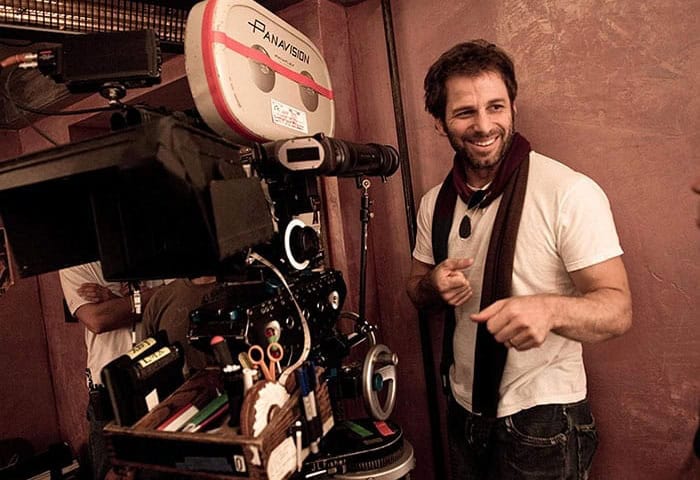Zack Snyder Returns to His Zombie Roots with ‘Army of the Dead’
In steering clear of yet another comic adaptation, the ‘Justice League’ helmer could be going in the right direction.

After taking some time off from filmmaking, Zack Snyder is readier than ever to direct again. Divisive as the helmer is, he has evidently taken on a project that actually seems perfect for his strengths.
The Hollywood Reporter announced that the Watchmen and Justice League director is looking to reinvent himself by going back to basics in a couple of ways. Snyder will helm the zombie action flick Army of the Dead for Netflix, and it will be his first film in nearly a decade to feature an original concept.
Snyder tells THR, “I thought this was a good palate cleanser to really dig in with both hands and make something fun and epic and crazy and bonkers in the best possible way,” and it’s easy to see why. The basic plot of Army of the Dead already pulls no punches. Set during a zombie outbreak in Las Vegas, the film follows a man and his assembled gang of mercenaries who pledge to “take the ultimate gamble” and brave a quarantined zone for a high-stakes heist.
Scripting duties are delegated to Joby Harold, who has been involved in producing projects such as WGN’s Underground and writing the Guy Ritchie motion picture King Arthur: Legend of the Sword. However, concept-wise, it definitely sounds like the quintessential stylish popcorn fare that Snyder is (in)famous for.
Army of the Dead has everything that we could easily associate with Snyder’s cinematic footprint; from unadulterated mayhem, a ton of characters, and ostensibly very little time to think in between. The urge to recall overly long fight scenes in his DCEU movies might be strong. Still, these traits don’t always culminate in disaster.
The most intriguing thing about Snyder’s films is how many of them are truly difficult to love, although it’s not impossible. Snyder often operates in broad strokes, appearing to bypass consistent nuanced storytelling in favor of a strong visual footprint. But his debut feature, a remake of George A. Romero’s Dawn of the Dead, actually thrives on these aspects, despite it being so unequivocally different from its 1978 predecessor.
Snyder goes against many of Romero’s principles of zombie storytelling with his redo. The 2004 film incorporates fast-moving undead creatures and likable but scarcely-developed protagonists. This stands in stark contrast to the more contemplative, chilling scares of the 1978 version.
Apart from minor nods and a shared title, the two versions of Dawn of the Dead are wildly different films. Nevertheless, Snyder proved he could create an unabashedly entertaining and memorable horror-tinged action flick.
The director’s filmography then fast-forwards past a couple of comic adaptations — 300 being more questionable than Watchmen — and a cute animated coming-of-age adventure about owls. We land on Snyder’s first film stemming from an idea out of his own brain. Co-penned with Steve Shibuya (whose tangible writing credits are considerably thin otherwise), Sucker Punch is purely divisive and for good reason.
The film thoroughly plays up the video game aesthetic of Snyder’s style, utilizing overlapping plotlines that switch between the fantasy and brutal reality of several girls who are institutionalized in a horrifically abusive asylum. Sucker Punch‘s highly gratuitous imagery walks a fine line between being empowering and exploitative. In fact, it sometimes just trades one for another as it transitions into each new set piece.
However, Sucker Punch can be surprisingly layered in its approach to deconstructing the male gaze, as well. When I caught it at the movies back in 2011, I was turned off by its sheer aestheticization and seemingly untethered plot. Pair that with a bleakness that wasn’t apparent in its marketing and the fact that Snyder hardly crafts the best female characters in the first place, and the kind of violence that these leads are subjected to was difficult to relate to.
Yet, Sucker Punch has aged slightly better over time. A rewatch has opened up new possibilities of perspective for these characters as they navigate escapist images to take control of their surroundings and regain agency after trauma. In the end, one of the protagonists’ bittersweet sacrifices comes across as more thoughtful than random.
Notably, Sucker Punch isn’t the perfect critique of toxic masculinity. It still makes use of harmful tropes and representations (especially violence against women) in the name of purportedly calling out a gross system. Regardless, it also offers an appreciably compelling counterpoint to plenty of other Snyder films.
Of course, there’s no way to know how much Army of the Dead will defer to these older Snyder movies, no matter how similar they sound. From what the director has told THR, there will be some form of self-awareness, at least.
Realistically, we can probably only count on the overuse of slow-motion. That said, as a small mention to Army of the Dead‘s screenwriter Harold Ritchie’s Legend of the Sword is truly silly but decently good fun. That goes against general critical reception, but that kind of writing is easily supplemented by visual-driven filmmaking.
Overall, Snyder’s tried-and-true methods of viscerally bloody zombie action could coalesce with his unexpectedly unique original ideas and turn into a worthy project. This is a Snyder we don’t get to see all too often anyway, which is exciting in its own right.